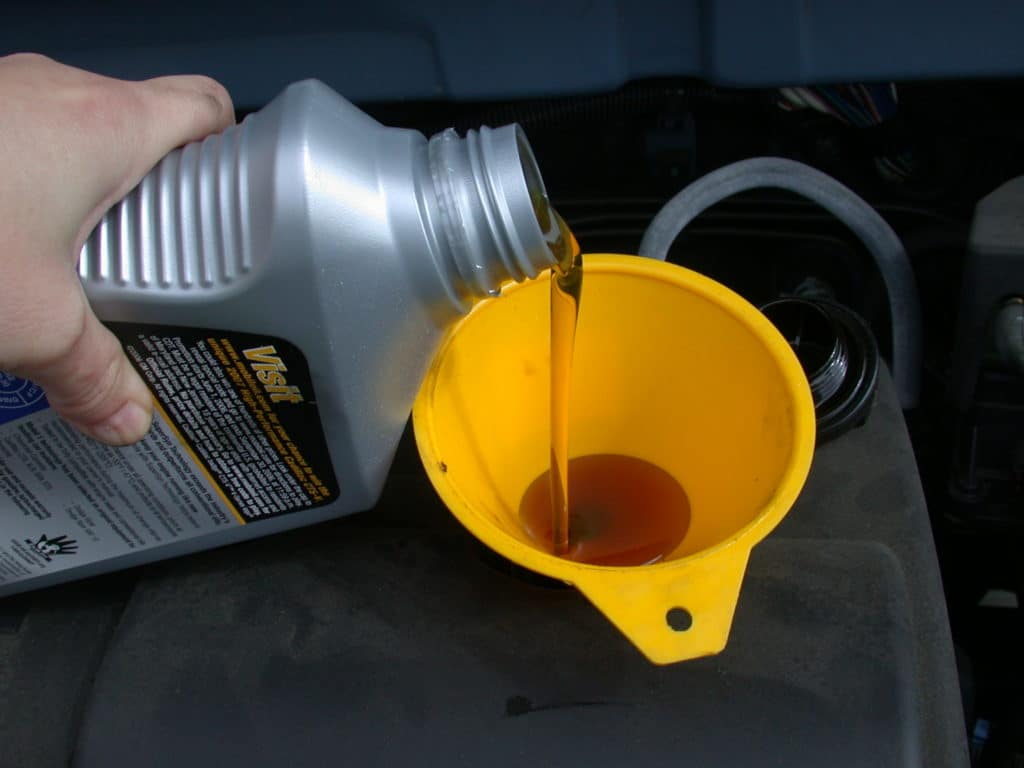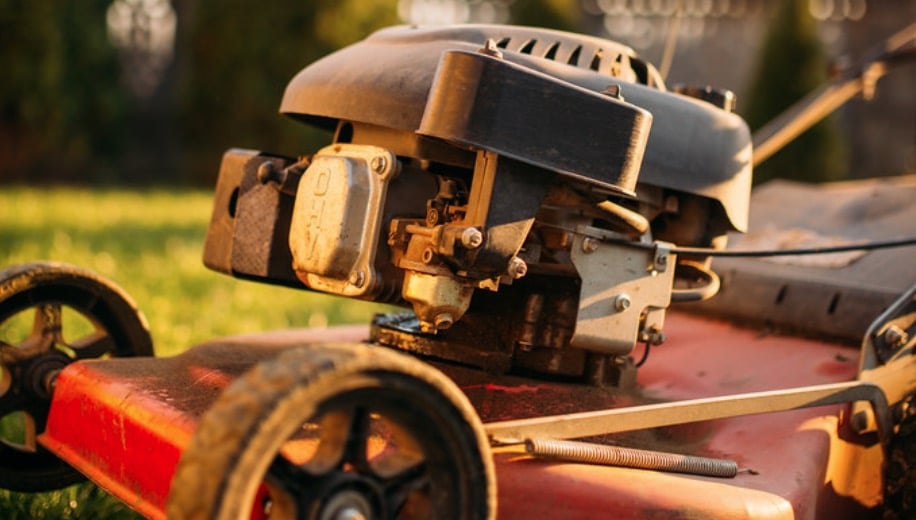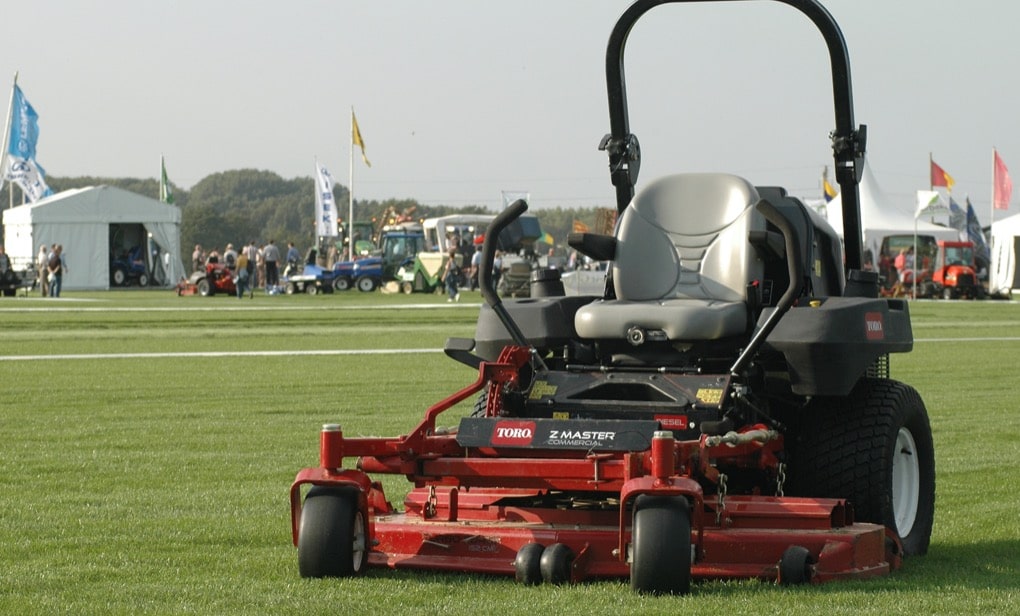Most lawnmowers are air cooled. Since they can’t really get a coolant leak, it’s normal to wonder “do lawnmowers overheat?”.
The answer is, yes lawnmowers absolutely can and do overheat.
| Reason | Description | How It Happens | Consequence |
|---|---|---|---|
| Blocked Air Passages | Debris obstructing air flow. | Accumulation of grass, dirt, or debris around air vents. | Reduced cooling, leading to overheating. |
| Low Oil Level | Insufficient lubrication and cooling from oil. | Neglecting oil checks and refills. | Increased friction and heat in engine parts. |
| Faulty Spark Plug | Spark plug issues affecting engine performance. | Wear, incorrect gap, or carbon deposits on the spark plug. | Inefficient combustion, causing engine strain and overheating. |
| Dirty Air Filter | Restricted air flow due to a clogged air filter. | Failing to clean or replace air filters regularly. | Inadequate air for cooling and combustion, leading to overheating. |
| Overworking the Engine | Pushing the mower beyond its capacity. | Cutting too tall or thick grass, or overuse. | Excess strain and heat buildup in the engine. |
| Cooling Fins Damaged or Dirty | Compromised efficiency of cooling fins. | Impact damage or buildup of debris on cooling fins. | Reduced heat dissipation, resulting in overheating. |
| Malfunctioning Engine Parts | Problems with internal engine components. | Wear and tear, or defects in parts like the piston. | Increased internal engine temperatures. |
| Incorrect Engine Load | Operating the mower under inappropriate conditions. | Using wrong attachments or settings for a given task. | Engine works harder than designed, causing overheating. |
Overheating Lawnmower Symptoms
There may not be much in the way of symptoms when a mower is overheating. The most common one is that it’ll die and won’t start again until it has time to cool off.
If this is the case, don’t try and get it started again. Give it time to cool off and see if you can find what is causing the overheating.
Overheated Lawn Mower Causes
Here are some of the most common reasons that a lawn mower would overheat. Please note that this guide will be applicable to both riding and push mowers. Riders use a larger version of the same air cooled concept.
1. Low Oil or Wrong Oil

Without dedicated engine coolant, oil plays a very important role in keeping your mower’s engines cooled off. Make sure that you are putting in the proper weight of oil. Most Briggs and Stratton engines want 30 weight oil. But, you should check the exact specifications for your mower.
It is important to use the proper weight because thinner oil does a better job at heat dissipation than thicker oil.
Even more important than oil weight is making sure that the mower is completely full of oil. Just think about the oil level like you are checking the engine coolant. With less oil in the crankcase, there is less oil to dissipate heat.
Always make sure to check the oil level before you mow. Every single time. This all but eliminates the possibility of your mower overheating due to an oiling issue.
2. Cooling Fin Blockage

On a liquid-cooled engine, there is a radiator that dissipates heat and sends the coolant back to the engine, ready to pull more heat out of it. In an air-cooled engine, this job is done by the cooling fins.
Over the years (or even on a really bad day) the cooling fins can fill up with yard debris and dirt. When this happens they will no longer be able to cool the engine properly.
Check to see if they are blocked up. If they even look dirty, scrub them down really well. Take care not to get water into the air cleaner or engine. You can get pretty far just using a good brush.
If an engine runs too hot, it can cause the head gasket to blow.
3. Clogged Deck
The cutting deck is where most of the engine’s power goes (all of it on a push mower). If the deck is clogged with debris, the cutting blades will have a lot more to contend with than just grass. They’ll have to push through all of the debris. This can often happen after you’ve cut in the rain.
You should also ensure that nothing is rubbing the belt that turns the blades on a riding mower. It’s not uncommon for a stick or rock to get lodged up there and cause the mower to have to work so hard that it overheats.
4. Other Causes
- Poor Engine Maintenance– Running a mower for extended periods can be hard on the engine. If it’s been a while since it last had a tune-up, it can be even harder.
- Mowing in Wet Conditions– Even if the grass clippings aren’t all sticking to the deck, mowing in the wet can cause a lot of extra work for the engine, leading to overheating.
Water Cooled Mower Overheating

Most lawnmowers are air-cooled. Some of the more high-end commercial applications and tractors are water-cooled. Diagnosing why a water-cooled engine is overheating is a bit more straightforward. A water cooled mower absolutely can overheat.
Do not open the radiator or fill and engine back up with coolant while the engine is warm. Opening a hot radiator can cause scalding coolant to erupt into your face. Filling it with cold coolant while the engine is hot can cause the engine block to crack.
- Low Coolant– The first thing that you want to check when a water-cooled mower is overheating is to see if the coolant level is full. If it has an overflow canister. Check to see if there is any coolant in it.
- Bad Thermostat– The thermostat regulates the engine temperature by opening up and allowing coolant to enter only after it has reached a certain temperature. If it goes bad it may stay shut, keeping the coolant that would go into the engine out of it.
- Radiator Fins Dirty– Take a look at the radiator. Are there tons of dirt and debris jammed in there? A dirty radiator can not properly dissipate heat. When the radiator IS COOL take a hose to it and clean all of that gunk out of there. Hopefully that’ll get you back up and running.
- Bad Radiator– A radiator can go bad on the inside, not allowing it to cool the coolant properly. If this is the case, radiator replacement will be necessary.
A clogged deck can cause a water-cooled mower to overheat as well. So make sure to take a look at that as well.
Wrapping Up
We outlined some of the most common reasons why any mower can overheat. And yes, they can overheat. Good luck repairing your mower. While it’s rare for an overheating engine to catch a mower on fire, it can happen.
Please feel free to leave a comment below with what happened with your mower and how you fixed it. You might be able to help somebody else that way!